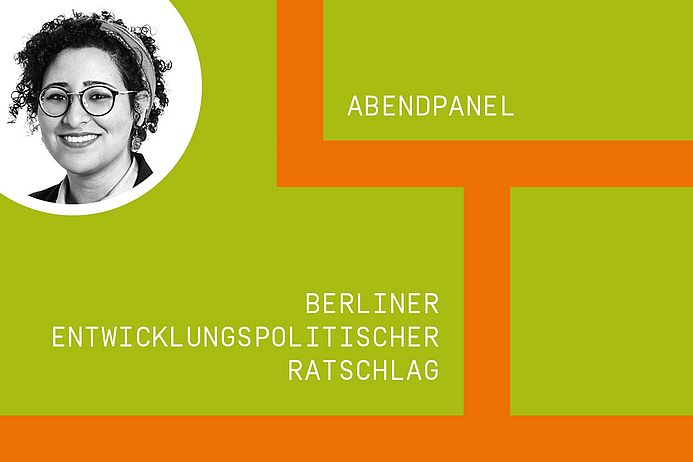13.11.2025 | Berlin
BER-Abendpanel: Globale Kämpfe verbinden

Wie können queer-feministische und dekoloniale Ansätze globale Machtverhältnisse in der Entwicklungszusammenarbeit überwinden?
+++ english below +++
Weltweit ist ein besorgniserregender Backlash gegen die Rechte von LSBTIQ*-Personen, gegen Geschlechtergerechtigkeit sowie gegen sexuelle und reproduktive Gesundheit zu beobachten. Diese Entwicklungen sind Ausdruck tiefer gesellschaftlicher Machtverschiebungen – und sie betreffen uns alle. Auch in Berlin sind queer-bezogene Bildungsprojekte wie QueerLeben, Queerformat und der Queer History Month bedroht – ein Rückschritt, der nicht nur die Bildungslandschaft, sondern auch das gesellschaftliche Klima nachhaltig beeinflusst. Diese Angriffe auf LSBTIQ*-Rechte stehen in Zusammenhang mit weltweiten, patriarchalen und kolonial geprägten Machtverhältnissen.
Das BER-Abendpanel fokussiert auf die Strukturen und Praktiken der Entwicklungszusammenarbeit. Denn auch hier wirken koloniale Kontinuitäten fort. Viele der heute im Globalen Süden geltenden Strafgesetze gegen homosexuelle Handlungen sind direkte koloniale Hinterlassenschaften. Europäische Kolonialmächte haben nicht nur ihre Rechtsnormen exportiert, sondern auch binäre Geschlechterrollen gewaltsam durchgesetzt. Diese kolonialen Prägungen beeinflussen bis heute, wer Zugang zu Ressourcen, politischem Schutz und gesellschaftlicher Teilhabe hat – und wer nicht.
Gemeinsam mit unseren Referent*innen
Radwa Khaled-Ibrahim (sie/ihr) von medico international, Abdul-Wadud Mohammed (they/them), ehemalige*r stellvertretender* Direktor*in von LGBT+Rights Ghana und Edward Mutebi (er/ihm) von der Queeren Nothilfe
Moderation: Jaqui Steinberger (kein Pronomen/sie), BER
diskutieren wir:
Wie können wir die Kämpfe für Gleichberechtigung global zusammendenken? Wie lassen sich LSBTIQ*-Rechte, Feminismus und Dekolonisierung gemeinsam als entwicklungspolitische Praxis begreifen? Welche Verantwortung haben wir in Berlin – als NROs, Aktivist*innen, entwicklungspolitische Akteur*innen und politische Entscheidungsträger*innen – gegenüber unseren Partner*innen im Globalen Süden? Wie können wir die Kämpfe unserer Verbündeten sichtbar machen, unterstützen und in eine gemeinsame Praxis überführen?
Bitte hier anmelden:
https://eineweltstadt.berlin/veranstaltungen/globale-kaempfe-verbinden-dekolonisierung-feminismus-und-lsbtiq-rechte/
Veranstaltet von: Berliner Entwicklungspolitischer Ratschlag
English
A worrying backlash against the rights of LGBTIQ* people, gender equality and sexual and reproductive health can be observed worldwide. These developments are an expression of profound shifts in social power – and they affect us all. In Berlin, too, queer-related educational projects such as QueerLeben, Queerformat and Queer History Month are under threat – a step backwards that will have a lasting impact not only on the educational landscape but also on the social climate. These attacks on LGBTIQ* rights are linked to global, patriarchal and colonial power structures.
The BER evening panel focuses on the structures and practices of development cooperation. For here, too, colonial continuities persist. Many of the criminal laws against homosexual acts that are still in force in the Global South today are a direct legacy of colonialism. European colonial powers not only exported their legal norms, but also forcibly imposed binary gender roles. These colonial influences continue to determine who has access to resources, political protection and social participation – and who does not.
Together with our speakers:
Speakers: Radwa Khaled-Ibrahim (she/her) from medico international, Abdul-Wadud Mohammed (they/them), former Deputy Director – LGBT+Rights Ghana and Edward Mutebi (he/him) from Queere Nothilfe
Moderator: Jaqui Steinberger (no pronouns/she), BER
we will discuss:
How can we think about the struggles for equality globally? How can LGBTIQ* rights, feminism and decolonisation be understood together as development policy practice? What responsibility do we in Berlin – as NGOs, activists, development policy actors and political decision-makers – have towards our partners in the Global South? How can we make the struggles of our allies visible, support them and translate them into joint practice?
Please register here:
https://eineweltstadt.berlin/veranstaltungen/globale-kaempfe-verbinden-dekolonisierung-feminismus-und-lsbtiq-rechte/
